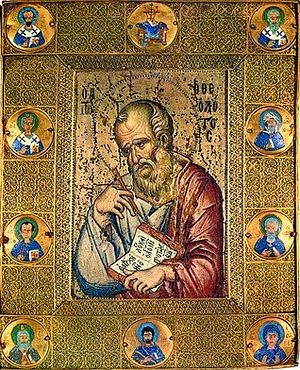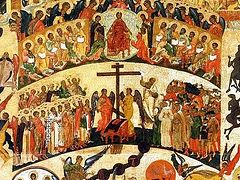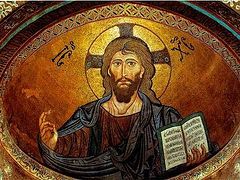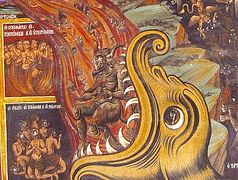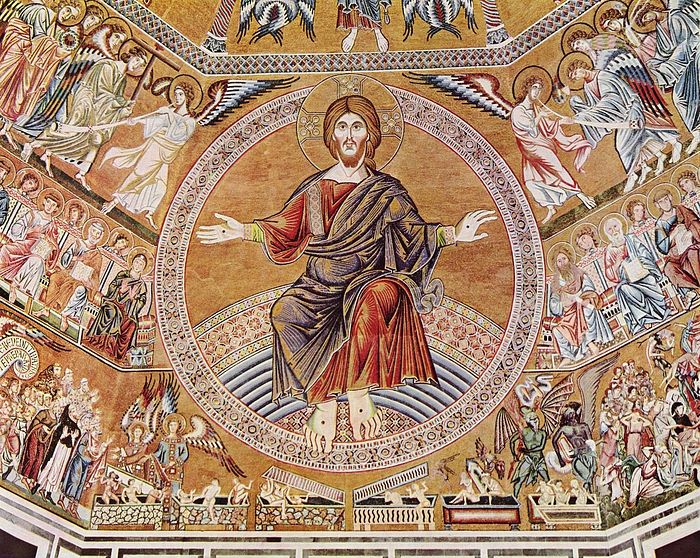 Christ the Pantocrator and the Last Judgment, 1300. Mosaic in the baptistry of San Giovanni, Florence, Itary. Photo: Wikimedia Commons
Christ the Pantocrator and the Last Judgment, 1300. Mosaic in the baptistry of San Giovanni, Florence, Itary. Photo: Wikimedia Commons Chapter 6: What is the First Resurrection, and What the Second.
After that He adds the words, Verily, verily, I say unto you, The hour is coming, and now is, when the dead shall hear the voice of the Son of God; and they that hear shall live. For as the Father has life in Himself; so has He given to the Son to have life in Himself (John 5:25-26). As yet He does not speak of the second resurrection, that is, the resurrection of the body, which shall be in the end, but of the first, which now is. It is for the sake of making this distinction that He says, The hour is coming, and now is. Now this resurrection regards not the body, but the soul. For souls, too, have a death of their own in wickedness and sins, whereby they are the dead of whom the same lips say, Suffer the dead to bury their dead (Matthew 8:22)—that is, let those who are dead in soul bury them that are dead in body. It is of these dead, then—the dead in ungodliness and wickedness—that He says, The hour is coming, and now is, when the dead shall hear the voice of the Son of God; and they that hear shall live. They that hear, that is, they who obey, believe, and persevere to the end. Here no difference is made between the good and the bad. For it is good for all men to hear His voice and live, by passing to the life of godliness from the death of ungodliness. Of this death the Apostle Paul says, Therefore all are dead, and He died for all, that they which live should not henceforth live unto themselves, but unto Him which died for them and rose again (2 Corinthians 5:14-15). Thus all, without one exception, were dead in sins, whether original or voluntary sins, sins of ignorance, or sins committed against knowledge; and for all the dead there died the one only person who lived, that is, who had no sin whatever, in order that they who live by the remission of their sins should live, not to themselves, but to Him who died for all, for our sins, and rose again for our justification, that we, believing in Him who justifies the ungodly, and being justified from ungodliness or quickened from death, may be able to attain to the first resurrection which now is. For in this first resurrection none have a part save those who shall be eternally blessed; but in the second, of which He goes on to speak, all, as we shall learn, have a part, both the blessed and the wretched. The one is the resurrection of mercy, the other of judgment. And therefore it is written in the psalm, I will sing of mercy and of judgment: unto You, O Lord, will I sing.
And of this judgment He went on to say, And has given Him authority to execute judgment also, because He is the Son of man. Here He shows that He will come to judge in that flesh in which He had come to be judged. For it is to show this He says, because He is the Son of man. And then follow the words for our purpose: Marvel not at this: for the hour is coming, in the which all that are in the graves shall hear His voice, and shall come forth; they that have done good, unto the resurrection of life; and they that have done evil, unto the resurrection of judgment (John 5:28-29). This judgment He uses here in the same sense as a little before, when He says, He that hears my word, and believes in Him that sent me, has everlasting life, and shall not come into judgment, but is passed from death to life; i.e., by having a part in the first resurrection, by which a transition from death to life is made in this present time, he shall not come into damnation, which He mentions by the name of judgment, as also in the place where He says, but they that have done evil unto the resurrection of judgment, i.e., of damnation. He, therefore, who would not be damned in the second resurrection, let him rise in the first. For the hour is coming, and now is, when the dead shall hear the voice of the Son of God; and they that hear shall live, i.e., shall not come into damnation, which is called the second death; into which death, after the second or bodily resurrection, they shall be hurled who do not rise in the first or spiritual resurrection. For the hour is coming (but here He does not say, and now is, because it shall come in the end of the world in the last and greatest judgment of God) when all that are in the graves shall hear His voice and shall come forth. He does not say, as in the first resurrection, “And they that Hear shall live.” For all shall not live, at least with such life as ought alone to be called life because it alone is blessed. For some kind of life they must have in order to hear, and come forth from the graves in their rising bodies. And why all shall not live He teaches in the words that follow: They that have done good, to the resurrection of life—these are they who shall live; but they that have done evil, to the resurrection of judgment—these are they who shall not live, for they shall die in the second death. They have done evil because their life has been evil; and their life has been evil because it has not been renewed in the first or spiritual resurrection which now is, or because they have not persevered to the end in their renewed life. As, then, there are two regenerations, of which I have already made mention—the one according to faith, and which takes place in the present life by means of baptism; the other according to the flesh, and which shall be accomplished in its incorruption and immortality by means of the great and final judgment—so are there also two resurrections—the one the first and spiritual resurrection, which has place in this life, and preserves us from coming into the second death; the other the second, which does not occur now, but in the end of the world, and which is of the body, not of the soul, and which by the last judgment shall dismiss some into the second death, others into that life which has no death.
Chapter 7: What is Written in the Revelation of John Regarding the Two Resurrections, and the Thousand Years, and What May Reasonably Be Held on These Points.
The evangelist John has spoken of these two resurrections in the book which is called the Apocalypse, but in such a way that some Christians do not understand the first of the two, and so construe the passage into ridiculous fancies. For the Apostle John says in the foresaid book, And I saw an angel come down from heaven. . . . Blessed and holy is he that has part in the first resurrection: on such the second death has no power; but they shall be priests of God and of Christ, and shall reign with Him a thousand years. Those who, on the strength of this passage, have suspected that the first resurrection is future and bodily, have been moved, among other things, specially by the number of a thousand years, as if it were a fit thing that the saints should thus enjoy a kind of Sabbath-rest during that period, a holy leisure after the labors of the six thousand years since man was created, and was on account of his great sin dismissed from the blessedness of paradise into the woes of this mortal life, so that thus, as it is written, One day is with the Lord as a thousand years, and a thousand years as one day (2 Peter 3:8), there should follow on the completion of six thousand years, as of six days, a kind of seventh-day Sabbath in the succeeding thousand years; and that it is for this purpose the saints rise, viz., to celebrate this Sabbath. And this opinion would not be objectionable, if it were believed that the joys of the saints in that Sabbath shall be spiritual, and consequent on the presence of God; for I myself, too, once held this opinion. But, as they assert that those who then rise again shall enjoy the leisure of immoderate carnal banquets, furnished with an amount of meat and drink such as not only to shock the feeling of the temperate, but even to surpass the measure of credulity itself, such assertions can be believed only by the carnal. They who do believe them are called by the spiritual Chiliasts, which we may literally reproduce by the name Millenarians. It were a tedious process to refute these opinions point by point: we prefer proceeding to show how that passage of Scripture should be understood.
The Lord Jesus Christ Himself says, No man can enter into a strong man's house, and spoil his goods, except he first bind the strong man—meaning by the strong man the devil, because he had power to take captive the human race; and meaning by his goods which he was to take, those who had been held by the devil in various sins and iniquities, but were to become believers in Himself. It was then for the binding of this strong one that the apostle saw in the Apocalypse an angel coming down from heaven, having the key of the abyss, and a chain in his hand. And he laid hold, he says, on the dragon, that old serpent, which is called the devil and Satan, and bound him a thousand years—that is, bridled and restrained his power so that he could not seduce and gain possession of those who were to be freed. Now the thousand years may be understood in two ways, so far as occurs to me: either because these things happen in the sixth thousand of years or sixth millennium (the latter part of which is now passing), as if during the sixth day, which is to be followed by a Sabbath which has no evening, the endless rest of the saints, so that, speaking of a part under the name of the whole, he calls the last part of the millennium—the part, that is, which had yet to expire before the end of the world—a thousand years; or he used the thousand years as an equivalent for the whole duration of this world, employing the number of perfection to mark the fullness of time. For a thousand is the cube of ten. For ten times ten makes a hundred, that is; the square on a plane superficies. But to give this superficies height, and make it a cube, the hundred is again multiplied by ten, which gives a thousand. Besides, if a hundred is sometimes used for totality, as when the Lord said by way of promise to him that left all and followed Him He shall receive in this world an hundredfold (Matthew 19:29); of which the apostle gives, as it were, an explanation when he says, As having nothing, yet possessing all things (2 Corinthians 6:10)—for even of old it had been said, The whole world is the wealth of a believer, with how much greater reason is a thousand put for totality since it is the cube, while the other is only the square? And for the same reason we cannot better interpret the words of the psalm, He has been mindful of His covenant for ever, the word which He commanded to a thousand generations, than by understanding it to mean to all generations.
And he cast him into the abyss—i.e., cast the devil into the abyss. By the abyss is meant the countless multitude of the wicked whose hearts are unfathomably deep in malignity against the Church of God; not that the devil was not there before, but he is said to be cast in there, because, when prevented from harming believers, he takes more complete possession of the ungodly. For that man is more abundantly possessed by the devil who is not only alienated from God, but also gratuitously hates those who serve God. And shut him up, and set a seal upon him, that he should deceive the nations no more till the thousand years should be fulfilled. Shut him up—i.e., prohibited him from going out, from doing what was forbidden. And the addition of set a seal upon him seems to me to mean that it was designed to keep it a secret who belonged to the devil's party and who did not. For in this world this is a secret, for we cannot tell whether even the man who seems to stand shall fall, or whether he who seems to lie shall rise again. But by the chain and prison-house of this interdict the devil is prohibited and restrained from seducing those nations which belong to Christ, but which he formerly seduced or held in subjection. For before the foundation of the world God chose to rescue these from the power of darkness, and to translate them into the kingdom of the Son of His love, as the apostle says (Colossians 1:13). For what Christian is not aware that he seduces nations even now, and draws them with himself to eternal punishment, but not those predestined to eternal life? And let no one be dismayed by the circumstance that the devil often seduces even those who have been regenerated in Christ, and begun to walk in God's way. For the Lord knows them that are His (2 Timothy 2:19), and of these the devil seduces none to eternal damnation. For it is as God, from whom nothing is hid even of things future, that the Lord knows them; not as a man, who sees a man at the present time (if he can be said to see one whose heart he does not see), but does not see even himself so far as to be able to know what kind of person he is to be. The devil, then, is bound and shut up in the abyss that he may not seduce the nations from which the Church is gathered, and which he formerly seduced before the Church existed. For it is not said that he should not seduce any man, but that he should not seduce the nations—meaning, no doubt, those among which the Church exists—till the thousand years should be fulfilled; i.e., either what remains of the sixth day which consists of a thousand years, or all the years which are to elapse till the end of the world.
The words, that he should not seduce the nations till the thousand years should be fulfilled, are not to be understood as indicating that afterwards he is to seduce only those nations from which the predestined Church is composed, and from seducing whom he is restrained by that chain and imprisonment; but they are used in conformity with that usage frequently employed in Scripture and exemplified in the psalm, So our eyes wait upon the Lord our God, until He have mercy upon us—not as if the eyes of His servants would no longer wait upon the Lord their God when He had mercy upon them. Or the order of the words is unquestionably this: And he shut him up and set a seal upon him, till the thousand years should be fulfilled; and the interposed clause, that he should seduce the nations no more, is not to be understood in the connection in which it stands, but separately, and as if added afterwards, so that the whole sentence might be read: And He shut him up and set a seal upon him till the thousand years should be fulfilled, that he should seduce the nations no more—i.e., he is shut up till the thousand years be fulfilled, on this account, that he may no more deceive the nations.
From: The Nicene and Post Nicene Fathers, by Phillip Schaff. For the complete text, see Christian Classics Ethereal Library.

